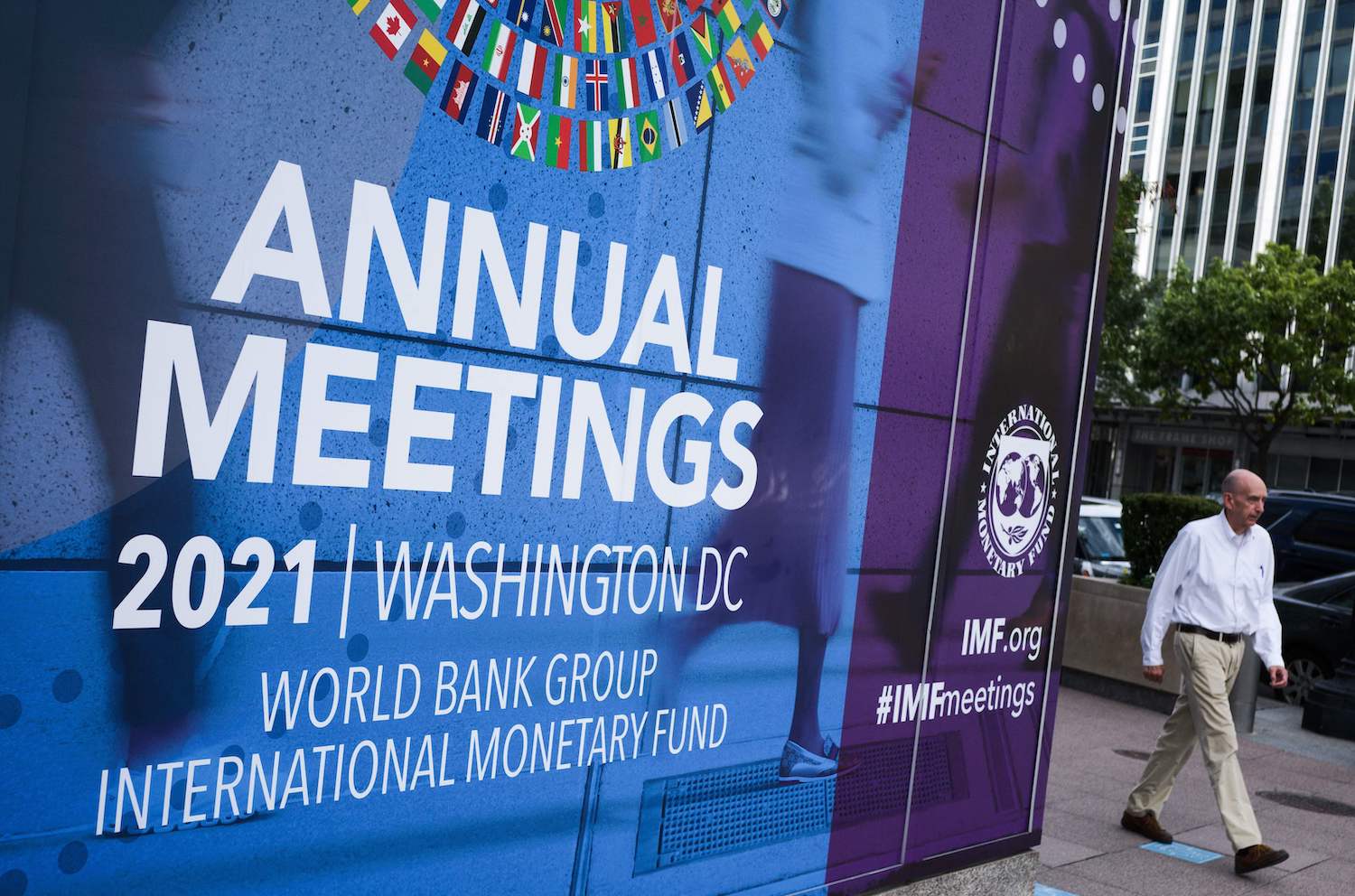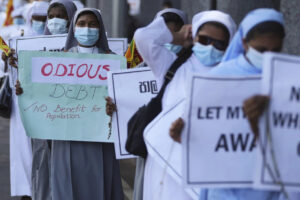The IMF-WBG claims to drive a “recovery” from the current crisis, but its actions mire countries further into pre-existing poverty, inequalities, and plunder of resources.
The International Monetary Fund (IMF) and the World Bank Group (WBG) recently concluded its Annual Meeting on a hopeful note. WBG President Malpass expressed commitment to “a recovery that ensures a broad and lasting rise in prosperity, especially for the poorest and most vulnerable.”[i] But their vision of recovery retains problematic assumptions.
Held amid a continuing crisis of the neoliberal system, the event upheld the ideology of the IMF-WBG: one that considers inequalities, debt,[ii] and the climate crisis as potential risks to profit-driven economic models, but not the direct effects of the policies and systems perpetuating underdevelopment of the South. As a result, plans addressed to these glaring problems fail, or rather deliberately refuse, to acknowledge the root causes.
IBON International denounces the IMF-WBG’s path for a corporate recovery reinforced in its 2021 Annual Meetings. It is an agenda that revitalises the profit-driven system that has enabled the corporate plunder of Southern countries. These proposals serve to further exploit Southern economies for the benefit of big private capital, and drive inequalities within and between countries.
The debt threat
WBG President David Malpass recently boasted about the Bank’s “all-time high” support towards poorest countries.[iii] At the same time, the WBG also commended itself for having “committed USD 157 billion to protect the poor and vulnerable, expand social protection, support businesses, and preserve and create jobs”.[iv]
Over the second year of the global pandemic, however, IMF-WBG’s response, especially in the global South, simply involved more debt and lending conditionalities.
The IMF-WBG stepped in last year by offering a total of USD250 billion in loans,[v] while expressing support for the G20 Debt Service Suspension Initiative (DSSI).[vi] The debt service postponements only provided short-term relief to indebted countries. Despite acknowledging the threat of debt faced by low-income countries, the IMF-WBG has not signalled any concessions to demands for debt cancellations. In guaranteeing that indebted countries can pay after the suspensions, it also secures the lenders’ stream of profits in the future.
A “recovery” for greed
The IMF-WBG claims to drive a “recovery” from the current crisis, but its actions mire countries further into pre-existing poverty, inequalities, and plunder of resources. IBON International remains extremely concerned over the IMF-WBG’s path of advancing the greenwashing of resource extraction from the global South.
The ‘Green, Resilient and Inclusive Development’ (GRID) was introduced by the WBG as a post-pandemic recovery plan which also addresses the climate crisis, debts, and pandemic inequalities.[vii] Under the pretext of “rebuilding better”, GRID is directed to the revitalisation of the big private sector in the name of “mobil[ising] private financing to developing countries”[viii] since “[p]rivate sector solutions and innovative financing will be needed to drive the recovery.”[ix] GRID opens the door to more structural reforms and policy conditionalities to set up countries as hosts for vampiric transnational corporations (TNCs) and finance capital affected by the disruption of capital flow due to the pandemic.
Despite acknowledging the threat of debt faced by low-income countries, the IMF-WBG has not signalled any concessions to demands for debt cancellations.
Protecting pandemic profiteering
IBON International also condemns the IMF-WBG’s continued promotion of corporate monopolisation of vaccines and technologies. While it admits that protracted vaccination drive delayed the delivery of vaccine supplies to poorer countries, it stubbornly opposes demands to waive neoliberal trade rules, particularly the Trade-Related Aspects in Intellectual Property Rights (TRIPS) Agreement.[x]
As of today, the global vaccination effort has only given at least one dose to less than half, or 48.10%, of the world population.[xi] Doses were concentrated in the global North, while most of the global South falls behind. In the European Union, 70% of adults have received completed doses[xii] but only 4% of Africa’s population have been fully vaccinated.[xiii] Such a trend compromises the efforts to stem the crisis, as mutations of the COVID-19 virus, such as the current Delta variant, could render contemporary vaccines ineffective within a year or less.[xiv] The TRIPS itself stops the South from developing their own vaccines, medical technologies, and their own national science and technology sector.
The IMF-WBG stubbornly opposes demands to waive neoliberal trade rules, particularly the Trade-Related Aspects in Intellectual Property Rights (TRIPS) Agreement. The TRIPS itself stops the South from developing their own vaccines, medical technologies, and their own national science and technology sector.
People-centred development, not a recovery for big private capital
As always, IBON International holds that a people-centred, transformative, and sustainable development demands moving beyond the current economic framework.
We believe that it is high time for multilateral lenders such as the IMF-WBG, together with bilateral and private lenders, to cancel Southern debts. Addressing the inequalities revealed by the pandemic must mean ending neoliberal conditionalities that destroyed any prospects for social services, agriculture, and industries to serve people’s needs.
Instead of a corporate recovery, a people-centred development calls for democratic ownership of current and future economic trajectories especially in agriculture and industry. The rights and sovereignty of workers, peasants, Indigenous Peoples, women, the urban poor, and even health workers would be its key foundations.
We also urge continued international solidarity in opposing IMF-WBG loans, conditionalities, and greenwashed big business-driven strategies which have been proven to be detrimental to economies. The recent Global Day of Action Against the IMF-WBG hasshown the voices of at least 60 organisations in 23 countries that oppose the current directions of these institutions in their countries and communities. These alliances must be further broadened, as we fight to reclaim our future from neoliberal priorities, and in the long-term, from the monopoly capitalist system. #
[i]https://www.worldbank.org/en/news/speech/2021/04/09/remarks-by-world-bank-group-president-david-malpass-to-the-spring-meetings-2021-development-committee
[ii] https://www.theguardian.com/global-development/2021/sep/23/more-than-100-countries-face-spending-cuts-as-covid-worsens-debt-crisis-report-warns
[iii] https://www.worldbank.org/en/news/speech/2021/10/13/remarks-by-world-bank-group-president-david-malpass-at-the-2021-annual-meetings-opening-press-conference
[iv] https://www.worldbank.org/en/news/press-release/2021/10/15/world-bank-imf-annual-meetings-2021-development-committee-communiqu
[v] https://www.imf.org/en/Topics/imf-and-covid19/COVID-Lending-Tracker
[vi] https://www.worldbank.org/en/topic/debt/brief/covid-19-debt-service-suspension-initiative
[vii] https://www.worldbank.org/en/news/feature/2021/04/09/working-toward-a-green-resilient-and-inclusive-recovery
[viii] https://www.worldbank.org/en/news/press-release/2021/10/15/world-bank-imf-annual-meetings-2021-development-committee-communiqu
[ix]https://www.devcommittee.org/sites/dc/files/download/Documents/2021-03/DC2021-0004%20Green%20Resilient%20final.pdf
[x]https://www.reuters.com/business/healthcare-pharmaceuticals/world-bank-chief-says-does-not-support-vaccine-intellectual-property-waiver-wto-2021-06-08/
[xi] https://ourworldindata.org/covid-vaccinations?country=OWID_WRL
[xii]https://www.nytimes.com/2021/08/31/world/eu-covid-vaccinations-70-percent.html
[xiii]https://www.nytimes.com/2021/09/30/world/africa/africa-covid-vaccine.html
[xiv] https://www.oxfam.org/en/press-releases/two-thirds-epidemiologists-warn-mutations-could-render-current-covid-vaccines


